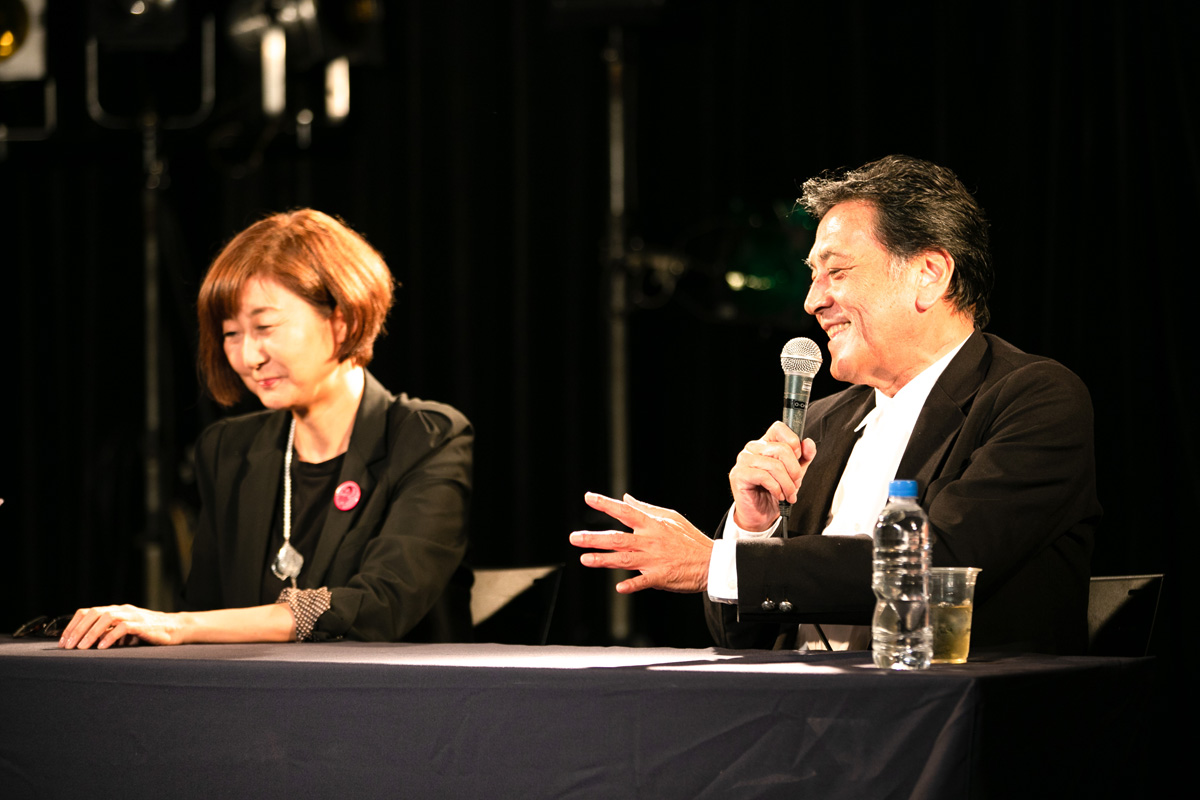
WHITE NIGHT WEEK SHIBUYA
DAY 1 – SESSION 1
「ナイトシーンのリビングレジェンドが語る今昔、未来」
日時:11月5日(火)19:00〜19:45
登壇:
佐藤俊博(株式会社テーブルビート代表取締役 有限会社佐藤商品開発代表取締役)
臼杵杏希子(TEAL Inc.)
モデレーター:吉岡加奈
新宿「TSUBAKI HOUSE」、芝浦「GOLD」といった伝説的なディスコ、クラブを手がけた佐藤俊博さんと、芝浦「GOLD」でプレス及び企画の仕事についていたTEAL Inc.の臼杵杏希子さん。東京のナイトシーン黎明期の発展に大きく寄与した2人のリビングレジェンドが、「ナイトシーンの今昔、未来」をテーマにトークセッションを行いました。

ふたりの体験の共通点であるTSUBAKI HOUSE、GOLDについてまず振り返った佐藤さんと臼杵さん。2つの店舗が活況していた70年代〜80年代について、佐藤さんは「ある意味非常に活気があっておもしろかった。その背景には60年代の反戦運動があり、若者は表現のひとつとして音楽、ファッション、アートで自分の個性を主張しようとした。それが70年代に形になりだし、80年代に成熟した」といいます。
また、当時の音楽について「アメリカに憧れていたところがあったが、70年代後半のYMOから独自の音楽が生まれ出した。その時代は音楽、ファッション、アートが入り混じった時代で、当時活気があった理由もその混在のしかたにあった」と説明。臼杵さんは「例えば“テクノカット”などのファッションが好きな人が遊びにいく場所がTSUBAKI HOUSE、など、ファッションと音楽がすごく結びついている時代だった」と付け加えました。

また当時のTSUBAKI HOUSEについて「日本や海外の著名人が訪れるだけでなく、新宿二丁目のゲイシーンとも混ざり合うなど、多様な人が一緒に遊んでいた時代で、そこから当時の独自の文化が生まれていった」と語る佐藤さん。ファッション面ではディスコの仕事着を初めてTシャツ、ジーンズにするなど革新的な試みも行われており、そういった新しい取り組みをすることについて、「新しいことをしようとすると経営的には足踏みをする。音楽もファッションも変わっていくものだから、たとえ時間がかかるとしても次を育てなくてはいけない」と自らの哲学を示し、トーク中には「新しいことを始めると人はなかなかついてこないが、3人かっこいい人がフロアにいるとそれが変わる」という佐藤さんの名言も紹介される場面も。

さらにトークが進み、“今のクラブの原型”である1989年にオープンしたGOLDの話題になった際は、まず80年代に起きた音楽シーンの変化を説明した佐藤さん。
「これからはディスコのダンスミュージックではなく、クラブのハウスミュージックが良いんじゃないかと考えた。GOLDはそのためのナイトクラブだった」
当時主流として盛り上がっていたディスコ音楽に対する疑問からそう考えたといいます。
TSUBAKI HOUSEと同じく、「多様な人が混ざり合っていることが大事だと考えていたからこそ、GOLDには色々な構成のフロアを設けた」と語る佐藤さんですが、GOLDが掲げた音楽性であるハウスミュージックについて、臼杵さんは「毎週(ニューヨークの伝説的なディスコ)パラダイスガレージに通い、ラリー・レヴァンに洗脳されていくようにのめり込んでいった。ブラックカルチャーの台頭にあわせてパラダイスガレージも人気になり、そこにファッションの要素も入ってきて、カルチャーが変化していくのを感じた」と当時、ニューヨークで体験した現地シーンを振り返りました。
佐藤さんは、「その頃のGOLDは、世間からすると不良と思われていて自己表現を夜の世界に求めて集まって来る若者が多かった。しかしそれも個性のひとつであり、また当時は社会的に個性が活かしにくい時代だった」、続けて「文化は夜にしか生まれない。夜とは社会的な都合などが一時的に排除される時間で、個性が活きる時間。普段身に纏っているものが剥がれ、本当の自分を出すことができる」と語りました。臼杵さんもそれには「これまでもそういうことを何度も見ているから信じるしかない」と同意。

次に「今の渋谷のクラブシーンをどう感じているか?」という問いに対し、佐藤さんは「いつの時代もそうだが、コミュニティ作りがとにかく大事。街に住む人々が形成するコミュニティが色々なカルチャーを作っていく」と前置きした上で、
「渋谷は昼に文化を作れる街ではない。夜に文化を作れる街だからもっとそこを大事にしないといけない。今は街が変貌しているから難しいところがあるが、夜の世界のコミュニティを形作ることができるローカリズムがあれば、新しいカルチャーを作っていける。そのためにもナイトクラブは重要」。
臼杵さんは「ヨーロッパではDJカルチャーが巨大化し、大金を稼ぐDJがいて、日本との差を感じる。しかし、ヨーロッパと同じものを日本で作ろうとしても成立しない。共通項はあるけれど、オリジナリティが必要。もっと自信をもって自由に遊ぶ面白い人がいることがカルチャーの発展には必要」と語り、女性のナイトライフシーン進出についても「女性がもっと活躍するためにジェンダーギャップを解消していきたい。オーナーになれたり、ビジネスを展開できる人が増えて欲しい。そういうことができたら今とはまた違った街の魅力も生まれてくるはず」と今後のシーン発展に対する期待を口にしました。

また最後に佐藤さんは今後の課題解決に向けて提言。
「ナイトクラブを中心としたシーンの文化は夜に生まれるもの。渋谷の外から来る人が集まる場であることも結構なことだが、それを盛り上げるためにもそこに根付いたコミュニティができることが重要です」
長きに渡り東京のナイトライフシーンを見てきたからふたりだからこその視点で語られる言葉の一つ一つに重みがあり、来場されたみなさんがうなずきながら話を聞く姿が印象的なセッションとなりました。


